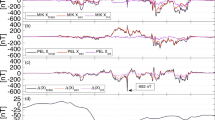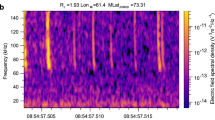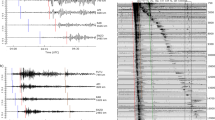Abstract
REGARDING the magnetic storm and the auroral display of June 17, 1915, referred to by Prof. Barnard and Father A. L. Cortie (see NATURE, vol. xcv., pp. 450, 536, etc.), it may be of interest to place on record the following facts. Independent reports presented by Mr. Tulloch, the meteorological observer, and Mr. Henderson, the wireless operator, at Macquarie Island, lat. 55°S., each mention the Aurora Australis of that date as the most brilliant noted in periods of one year and two years respectively. It was also the only occasion in two years when it was absolutely impossible to receive signals from any other station—even the high-power plant at Awanui, near Auckland (New Zealand), which seldom failed to make itself heard.
This is a preview of subscription content, access via your institution
Access options
Subscribe to this journal
Receive 51 print issues and online access
$199.00 per year
only $3.90 per issue
Buy this article
- Purchase on Springer Link
- Instant access to full article PDF
Prices may be subject to local taxes which are calculated during checkout
Similar content being viewed by others
Author information
Authors and Affiliations
Rights and permissions
About this article
Cite this article
HUNT, H. The Great Aurora of June 17, 1915. Nature 97, 421–422 (1916). https://doi.org/10.1038/097421c0
Issue Date:
DOI: https://doi.org/10.1038/097421c0
Comments
By submitting a comment you agree to abide by our Terms and Community Guidelines. If you find something abusive or that does not comply with our terms or guidelines please flag it as inappropriate.



